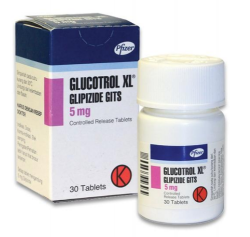Glucotrol XL (glipizide) Coupons, Discounts & Cost
Glucotrol XL (glipizide) belongs to the group of 2nd generation sulfonylurea drugs used for the treatment of insulin-independent diabetes. One way to save money on the Glucotrol XL (glipizide) retail cost regardless of income and insurance status is to use Glucotrol XL coupons or discount cards from RXCoupons. Use our Glipizide coupons at your online pharmacy and receive up to 75% off the sale price each time you refill your prescription.
Glucotrol XL drug information
Glucotrol XL (glipizide) is a synthetic hypoglycemic agent used for insulin-independent diabetes mellitus. The drug stimulates insulin secretion in patients with diabetes and lowers blood glucose levels. It has pancreatic, lipid-lowering, fibrinolytic and a mild diuretic effect.
Glucotrol XL is used for the treatment of non-insulin-dependent diabetes (patients with normal or excess body weight). The person begins to feel better within 10-30 min after administration.
Glucotrol XL contraindications
The drug is contraindicated in patients with hypersensitivity, insulin-dependent diabetes (juvenile diabetes, diabetic ketoacidosis or diabetic precoma), severe renal or hepatic impairment, stenosis of the digestive tract. Glucotrol XL should not be used in young patients (children) and patients with severe trauma, burns and infectious diseases.
The drug is also contraindicated during pregnancy. It should be used with caution in nursing women (high risk of hypoglycemia in neonates).
Glucotrol XL adverse reactions
Glucotrol XL therapy may cause hypoglycemia, nausea, diarrhea, pain in the epigastrium, cholestatic jaundice, toxic hepatitis, leukopenia, agranulocytosis, thrombocytopenia, hemolytic or aplastic anemia, pancytopenia, pruritus, urticaria, maculopapular rash.
General disorders: hypoglycemia (anxiety, confusion, decreased ability to focus and concentrate, fatigue, thirst, increased sweating, palpitations, headache, nausea, nervousness, nightmares, insomnia, speech impairments), hypoglycemic coma, blurred vision, emotional disturbances.
Skin disorders: rash on the skin and mucous membranes, pruritus, erythema multiforme (including Stevens-Johnson syndrome), toxic epidermal necrolysis (Lyell's syndrome), photosensitivity.
Hematopoiesis: anemia, aplastic and hemolytic anemia, pancytopenia, leukopenia, agranulocytosis, eosinophilia, thrombocytopenia.
Digestive system: nausea, vomiting, diarrhea or constipation, bloating, cholestatic jaundice, hepatic failure, hepatic porphyria, hepatitis, porphyria cutanea tarda.
Other disorders: weight gain, myalgia, convulsions, hyponatremia.
Overdose symptoms: hypoglycemia (sweating, severe weakness, palpitations, tremor, anxiety, headache, insomnia, irritability, depression, cerebral edema, impaired speech and vision, impaired consciousness), hypoglycemic coma.
Overdose treatment: if the patient is in a minimally conscious state, he should eat sugary foods. After that, it is important to pick foods rich in carbohydrate (to avoid recurrent hypoglycemic episodes).
Glucotrol XL instructions for use and dosage
The dose depends on the patient’s age and the severity of diabetes.
The tablets should be swallowed whole (without chewing and without breaking). The initial dose is 5 mg per day during or after breakfast. You may increase the dose once in a few days up to the maximum dose of 20 mg per day.
In diseases of the liver, kidney, and in elderly patients: the initial dose is 2.5 mg. The maximum single dose - 15 mg, the maximum daily dose - 45 mg.
If you take insulin or other hypoglycemic drugs, you should control the concentration of blood glucose during the first 4-5 days of therapy (2-4 times a day).
Preventative measures
It is not recommended to use Glucotrol XL in combination with miconazole. Avoid drinking alcohol during treatment. Patients should be informed regarding the increased risk of hypoglycemia in case of using NSAIDs or drinking alcohol in large quantities (including reactions such as abdominal pain, nausea, vomiting, headache).
Some drugs may mask the hypoglycemic symptoms (such as beta-blockers, clonidine, reserpine, guanethidine).
Long-term use may result in lower effectiveness of glipizide.
Antithyroid and myelotoxic drugs increase the risk of agranulocytosis and bone marrow hematopoiesis (including thrombocytopenia).
ACE inhibitors, cimetidine, antifungal drugs, NSAIDs, fibrates, salicylates, anabolic steroids, beta-blockers, MAO inhibitors, long-acting sulfonamides and some other drugs may enhance the effect of glipizide.

